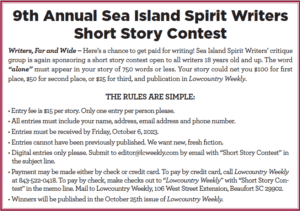Or maybe 100 bucks! Whether you’re a published writer, a dabbler in the craft of writing, or a wannabe writer 18 years old and up, this column will give you a heads-up about an opportunity to test your pen-to-paper or keyboard tap-tap-tap skills in the Sea Island Spirit Writers’ Annual Short Story Contest. Hard for those of us involved to believe, but the challenge is currently in its ninth year, presented in partnership with Lowcountry Weekly. As the deadline for entry is Friday, October 6th, those interested in giving their storytelling skills a shot still have a month-ish to get cracking on an entry. First place nets $100, second place is $50, and third place is $25, plus several honorable mentions. All for a mere $15 entry fee.
The top three stories will be published in the October 25th edition of Lowcountry Weekly. As the saying goes, you can’t win if you don’t enter. You know, like the lottery, but with more creativity involved.
Following is a kind of tutorial for those inclined to enter, just a few suggestions that might help your contest entry, or at least add a bit of freshness to your writing and/or writing process.
Many writers will admit that writing itself can be the fun part. Finding a market for a particular story, not so much, unless they’re fortunate enough to have scored a publisher. That’s a completely different column. One of the beauties about this contest is that a story need only be 750 words, or about 3 typewritten pages… or less. An entry can even be flash fiction, or a brief story of, say, 300 words. As in all good short story writing, in flash, every word must count toward a meaningful tale.
Another plus for this challenge is that you as a writer don’t have to try to think too hard of a direction to take your story. We’ve given you a prompt, i.e. a word that must appear in the story. You can even use the prompt – which is the word “alone” – to begin your story. Pretty cool.
A bit of background here. Though creating a story from a prompt may have been around for years, a classic book called Writing Down the Bones: Freeing the Writer Within by writing workshop guru Natalie Goldberg, beautifully birthed writing-from-prompt as a part of a method she calls “writing practice.” In this timed writing exercise, usually lasting for five to ten minutes initially, writers/students are given a word or phrase and specific instructions to follow during that time.
The Writing Down the Bones part of the book’s title simply means allowing yourself to get down to the nitty gritty in your heart and soul of what you want to say, what’s at your core that needs to be talked about, whether your focus is fiction or nonfiction. The other half, Freeing the Writer Within, is what makes writing practice such a powerful tool. I have yet to meet a writer who doesn’t at least occasionally have a self-critic whispering – sometimes yelling – in their ear, assuring that their writing is a piece of garbage that no one in his right mind would want to read. I certainly know that rascal intimately. By design, writing practice defuses the self-critic, at least for the time you’re writing, long enough for you to start learning to trust your own writing voice and process.
Doing writing practice, as Golberg recommends, “in a café with a friend,” then reading what you’ve written aloud to each other, can be helpful for developing your writing voice. During that process, the ol’ critic simply can’t interject any negativity into your mind if you keep your pen moving forward. Don’t think; just write. But once you put the pen down, it can roar back in with such slams as: That’s crappy writing. You should be ashamed. You should have written about something else. Et cetera. But when you read aloud and get back positives from another writer, that critical voice can be quelled.
Creating a complete story or essay during writing practice is not required, though some people do just that. With an emphasis on detailed description and the use of sensory input, this tool is a terrific way to create chunks of writing to develop into stories to be completed later. And by all means, let go of the outcome of where you may think the story is heading when you begin. Trust your gut if it suggests a possible change in direction. The gut’s neurons can often reveal some darn good alternatives. Of learning to trust your writing voice through writing practice, Goldberg says, “Be present with an open heart and mind.”
Reading Natalie’s book is not required for entering the Spirit Writers’ contest, though my discussion about it may lead you to think otherwise. But no matter what level of experienced writer you are, reading the insightful Writing Down the Bones will likely help you to get deeper in touch with your creative capacities. I highly recommend it… but there won’t be a quiz!
In case you’re not clear about what exactly a short story is and what it includes, here’s a leg up for you. By definition, a short story is a narrative of interrelated events, involving a conflict and a resolution. A good one should have:
- A clear beginning, middle and end.
- An attention-grabbing beginning. Go to a bookstore and peruse first lines of novels. Do most lead you into wanting to read on?
- Engaging plot and storyline. The protagonist (main character) has a goal to achieve.
- Action and tension.
- Conflict, i.e. obstacles and/or setbacks before the protagonist can reach the goal.
- Turning point in which the protagonist confronts the obstacle or setback.
- Satisfying resolution to tie up loose ends and answer unresolved questions.
- Strong narrative voice.
- Engaging story line.
- Character developed only to the extent required in the story.
Don’t be intimidated by this list. To enter the contest, just write what you know and send in your best story. Occasionally, in writing, as in life, if you break a rule and it works, that can be golden. Except in the case of the 9th Annual Sea Island Spirit Writers Short Story Contest Rules, which you’ll find right here on this page.
Says Goldberg, “I don’t think everyone wants to create the great American novel, but we all have a dream of telling our stories – of realizing what we think, feel, and see before we die. Writing is a path to meet ourselves and become intimate.”
And the better you know yourself, the better writer you become.







